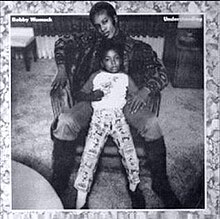Understanding (Bobby Womack album)
| Understanding | ||||
|---|---|---|---|---|
 |
||||
| Studio album by Bobby Womack | ||||
| Released | March 30, 1972 | |||
| Recorded | 1972 | |||
| Studio | American Sound Studio, Memphis, Tennessee Muscle Shoals Sound Studios, Muscle Shoals, Alabama |
|||
| Genre | Soul, funk | |||
| Length | 35:31 | |||
| Label | United Artists | |||
| Producer | Bobby Womack | |||
| Bobby Womack chronology | ||||
|
||||
| Professional ratings | |
|---|---|
| Review scores | |
| Source | Rating |
| AllMusic | |
Understanding is the fourth studio album by American musician Bobby Womack. The album was released on March 30, 1972, by United Artists Records. Womack recorded Understanding in Memphis, Tennessee at American Sound Studio and in Muscle Shoals Sound Studios in Muscle Shoals, Alabama. At Muscle Shoals, he utilized top session players, including drummer Roger Hawkins, guitarists Jimmy Johnson and Tippy Armstrong, bassist David Hood and keyboardist Barry Beckett.
The album reached No. 43 on the Billboard pop albums chart and No. 7 on the R&B albums chart. One of the key songs from the album, "I Can Understand It", has become a soul classic and was a major hit for New Birth the following year. The song was also covered by Womack's brothers The Valentinos (Curtis, Harry and Friendly, Jr.) with production from Bobby. The brothers sing background on the original version. The album version of "I Can Understand It" became a huge club hit in the northeast underground soul and gay clubs prior to the birth of disco. At that time, DJs skillfully played the cut directly from the album. New York City record stores began selling the album briskly when they noticed a highly diverse customer base buying Womack's music.
The first single released from Understanding was "Woman's Gotta Have It", a warning to a man who was taking his wife for granted, which Womack co-wrote with Darryl Carter and Linda Cooke Womack (Sam Cooke’s daughter). Recorded at American Sound, personnel on the track included Mike Leech on bass, Reggie Young on guitar, Hayward Bishop on drums and percussion, Bobby Wood on piano and Bobby Emmons on organ. With emphasis on Leech’s bass based on a slowed-down version of the bassline on Marvin Gaye's "What's Going On", the track was Womack’s first Number One R&B hit, topping the charts in the spring of 1972. He followed with a cover of Neil Diamond’s 1969 hit "Sweet Caroline (Good Times Never Seemed So Good)". The song had moderate success on the R&B charts, perhaps on the strength of Womack’s two previous hits. However, black radio deejays played the B-side, "Harry Hippie."
...
Wikipedia
